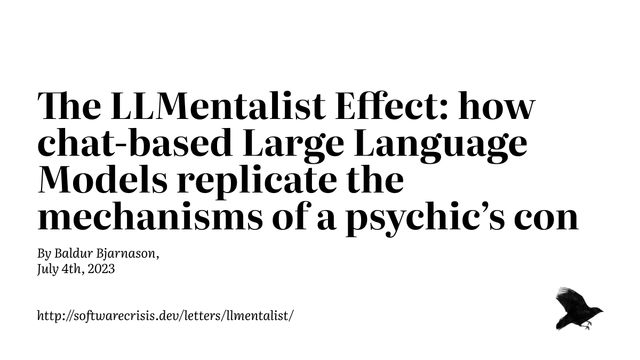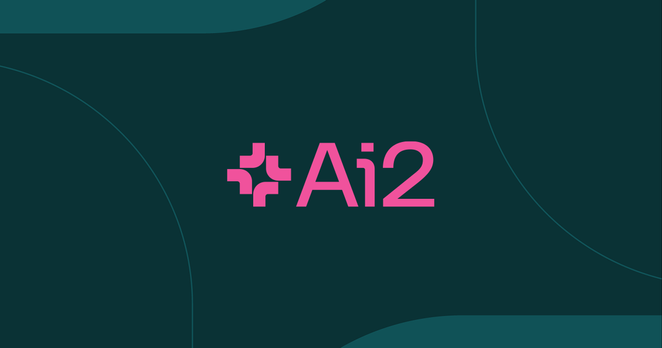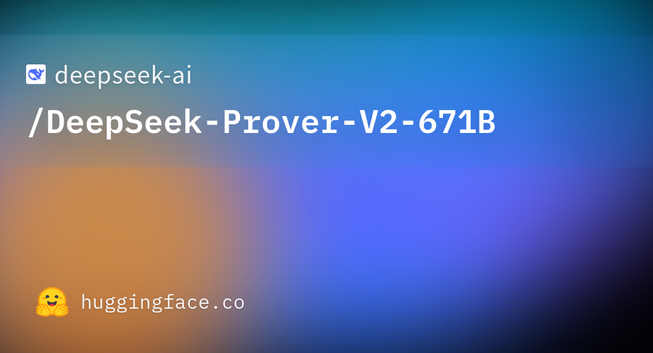This story about ChatGPT causing people to have harmful delusions has mind-blowing anecdotes. It's an important, alarming read.
Can you share some of them? I would like to read and share some of them.
I keep a public list about these things at https://notes.bayindirh.io/notes/Lists/Discussions+about+Artificial+Intelligence
This is so baffling to me. I've seen a less extreme version of this from some people ... who I thought would have known better.
What I find infuriating is how the industry selling LLMs has encouraged this kind of thinking with alarmist "AI might take over" and "here comes the singularity" talk. So irresponsible and dishonest.
That said, if you lose someone to an AI fueled spiritual fantasy I think in the absence of the tech it would have just been something else.
@grammargirl @futurebird it's just shy of 2 years old now, but I've continued to believe this is the best explanation. My first instinct was to read your article as the tragic "logical conclusion" of the line of thought:
https://softwarecrisis.dev/letters/llmentalist/
> I first thought that these were just classic cases of tech bubble enthusiasm, but no [...] This specific blend of awe, disbelief, and dread all sound like the words of a victim of a mentalist scam artist—psychics
Or if turning off memory isn’t as complete as they claim (as suggested in the article in the original post)
I had a friend who thought chat GPT was "very helpful with criticism of poetry" ... and that's true in the sense that it will look at phrases in your poem and Frankenstein together some responses with the general form and tone of what real people have said about real poems with similar patterns.
Maybe that might give someone some ideas for revisions along stereotypical lines.
It can't scan rhythm. It could easily miss the whole point and lead you to make derivative revisions.
I tried to explain why I thought it was a less than ideal method of getting feedback.
But, bumped up against a LOT of resistance. More than made sense to me.
So I decided to try it with one of my own poems.
The "feedback" was very flattering, ego-stroking in tone. Which made me really uncomfortable. I have no reason to think any real person might respond in the same way.
But I could see how if it seemed like "meaningful" feedback being told it's not wouldn't be pleasant.
Asking a LLM about your poems isn't the same as turning to it for religion... but I think it's along the same lines.
@Wyatt_H_Knott @futurebird @grammargirl I implore you wonderful people to try local LLMs with an open mind. Like most powerful tools, you get out of it what you put in and it can surely be misused.
Once it's running on an aging, modest computer right next to you, it's hard to not notice the staggering implications for our relationship with society's existing power structures. I have a personal tutor right out of Star Trek that nobody can take away from me or use to spy on me. Apart from all the cool automation and human-machine interaction it opens up, for an increasing number of tasks I can completely stop using search engines.
I think the "AI is just NFTs again but more evil; it just means the inevitable acceleration of billionaire takeover and ecosystem destruction; everyone who uses it is a gullible rube at best and an enemy at worst" clickbait ecosystem is misleading and unhealthy. It fuels conspiratorial thinking, incurious stigma, and a lot of unnecessary infighting.
Everyone loves their bubbles and hates them being popped. It's the same everywhere.
@Wifiwits @futurebird @Wyatt_H_Knott @grammargirl
@Mabande Compiler, shell, or other parser error, typically. For a lot of things, you can just look at it and tell whether the answer is correct or not. If you're unsure, you can ask the LLM for more surrounding information and a lot of times it will correct itself if it was wrong. You can also hook them up to tools or Retrieval-Augmented Generation (RAG) so they can fetch updated information and pluck out the details you need.
The people who build a personality out of complaining about things seriously misrepresent LLM inaccuracy and the woes that may ensue, in my experience. Notice how nobody provides full logs in any of these articles where they make outrageous claims.
I think the difference in experience could relate to domain knowledge?
Like, you seem to know tech on a fundamental level, so you can both prompt correctly and see if the answer's wrong for what you use it for, while a more low-knowledge user won't prompt correctly nor realize it's a wrong answer.
So then someone like the partners in the article asking Big Questions without knowing how to think about the answers will be awed by the confident sounding positive feedback loop.
@Mabande I understand what you're saying, but in my view the difference is simply about whether someone is open minded enough to practice and improve with a new tool that is being actively stigmatized. LLMs don't just produce randomly wrong output; with simpler questions, reliability approaches 100%. Lots of people will feed it a confusing word salad one time so it produces a stupid output and they can self-assuredly complain on social media like they know what they're talking about. It's about prejudicial reinforcement, not personal growth or understanding. Regardless, I don't think this criticism (or any other that I have read) is unique to LLMs; inexperienced computer users have a harder time getting good information regardless of the tool they use.
As for those people in the article, I think it's safe to say they weren't mentally healthy in the first place. There are many ways that people seek to reinforce paranoid delusions, it doesn't surprise me that LLMs would be one of them. Nonetheless, I think it's telling that logs are virtually never provided to support the more extreme claims people make.
Exactly. It's just like any powerful tool, like say a power saw. Whether or not you understand it and how to use it will determine whether or not you can use it to do amazing things, or cut off someone's arm (even your own). So it's not so much a matter of using them with an open mind, but instead an informed one. I know that I myself have used them successfully many times, but I know how to prompt them, and how and when to check their answers.
@necedema @Wyatt_H_Knott @grammargirl
Do “local LLMs” use training data compiled locally only? Or do you have a copy (a snapshot) of the associative matrices used by cloud based LLMs stored locally so you can run LLM prompts without an internet connection?
@hosford42 @necedema @Wyatt_H_Knott @grammargirl
So, almost no one is using this tool in this way.
Very few are running these things locally. Fewer still creating their own (attributed, responsibly obtained) data sources. What that tells me is this isn’t about the technology that allows this kind of recomposition of data it’s about using (exploiting) the vast sea of information online in a novel way.
@hosford42 @necedema @Wyatt_H_Knott @grammargirl
It’s like the sophomoric “hack” for keeping up with all the damned five paragraph essays. Just search on the internet for a few documents with good-sounding paragraphs. Copy and paste chunks of sentences into a word document. Then carefully read and reword it all so it’s “not plagiarism”
This is still plagiarism.
GPT will cheerfully help with that last step now.
@hosford42 @necedema @Wyatt_H_Knott @grammargirl
And yet none of the English and History teachers I know are very worried about this. Because the results of this process are always C-student work. The essay has no momentum, no cohesive idea justifying its existence beyond “I needed to turn some words in”
It’s swill.
@futurebird @hosford42 @necedema @Wyatt_H_Knott @grammargirl
English and History teachers have not been thinking their whole life about (a) the position of humans in a technological society and (b) the fallout from technology.
I seriously think the don't see the holocaust of culture coming.
@hosford42 @necedema @Wyatt_H_Knott @grammargirl
There's a whole movement of running them locally but it's niche, though the smaller versions are getting better.
But nobody is creating them locally. Fine-tuning with your own data yes, but that's a little sauce over existing training data.
@hosford42 @futurebird @necedema @Wyatt_H_Knott @grammargirl how can you have all that training data stored locally? if stored locally u certainly can't use it as a search engine for the wealth of material on the www.
i don't understand
@barrygoldman1 @hosford42 @futurebird @necedema @Wyatt_H_Knott @grammargirl
Here's the full Deepseek model, for example https://huggingface.co/deepseek-ai/DeepSeek-Prover-V2-671B
And a version you can run on an 8GB GPU locally https://huggingface.co/deepseek-ai/DeepSeek-Prover-V2-7B
Edit: you don't need the source training data.
@barrygoldman1 @hosford42 @futurebird @necedema @Wyatt_H_Knott @grammargirl I mean, online ones aren't good search engines either. But yes, you can have them stored locally. They essentially work somewhat like a database, but in a way it's sort of lossy compression, so they can be small enough to fit locally. Especially if you increase the lossiness.
A local model can actually be decent quality compared to the online ones despite "dumbing down." The losses tend to be mostly fluff. Unfortunately, the training data is still the real problem. If you ask about a quest in Skyrim it can probably tell you right. If you ask about some show you saw ten years ago few people ever heard of it might recognize it and tell you a bit, but will probably get characters wrong or something.
@futurebird @necedema @Wyatt_H_Knott @grammargirl
Oh sorry I said the same thing hours later!



 🇨🇦
🇨🇦

